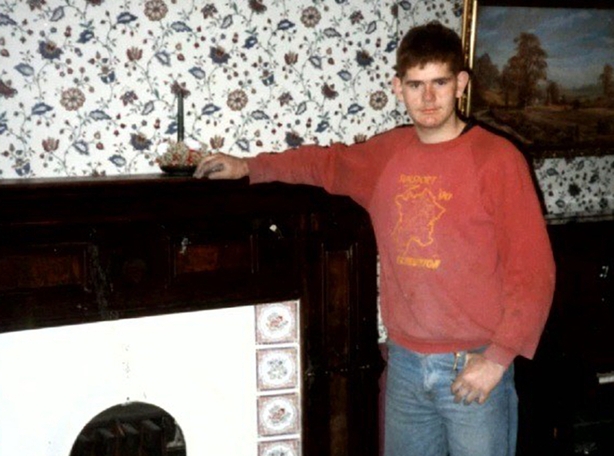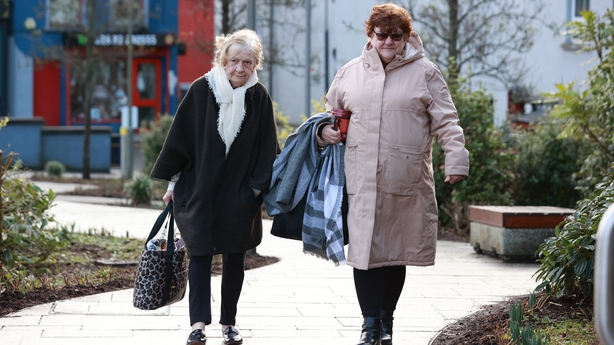The man who led the campaign for a public inquiry into the Omagh bombing has said dissident republicans responsible for the atrocity were freedom takers, not freedom fighters.
Michael Gallagher told the inquiry into the 1998 attack about the loss of his 21-year-old son Aiden, one of 29 people to die in the explosion.
Mr Gallagher said, on that day, the Real IRA had "declared war on an unsuspecting civilian population for their own political ends".
"This is a group that describes themselves as freedom fighters. In fact I think they are freedom takers, the victims have ended up being the freedom fighters."
Earlier, Mr Gallagher described his final interaction with his son, who had gone into town to buy jeans.
He said he told Aiden the most convenient place to park and he left.
Mr Gallagher said that about an hour later he heard the explosion and went into Omagh to look for his son.
He was unable to find him and went to the town's hospital to try and find him.
The place was in "total chaos" with people turning up in private cars and the injured lying around outside.
The only comparison he could make was what he imagined the Vietnam War was like.
Mr Gallagher later found the young man who had been with his son. He returned to the town and went to the car park where he had told Aiden to leave his vehicle.
"There were only two cars in the car park and one of them was Aiden's. I knew then we were in trouble."
Mr Gallagher said the period of the wake and funeral was very difficult, adding that a huge number of Aiden's friends, including two vanloads of young men from the Traveller community, turned up.
He said he had taught his children to treat everyone equally.

"Many of Aiden's friends were Protestants. We didn't discriminate and that was the bottom line.
"Many of the people that were the first to hold our hands and be there for us were Protestants and I think it's important that people know that."
Mr Gallagher told the inquiry his son was blessed with a sharp wit and a sense of humour which earned him the role of "joker in the pack" amongst his friends.
"He was fun to be with," Mr Gallagher said.
However, he said his son also had a sensitive side and had a special bond with his mother Patsy.
Mr Gallagher said that even in adulthood, when 6'3" Aiden towered over his 5'2" mother, he still confided in her and sought her counsel.
He said he did not know how his wife had managed to continue after the murder of her son due to the special nature of their relationship.
"It was a bond that should never have been broken," he said.
Mr Gallagher said that his son shared a birthday with his grandfather John and the pair were very close.
John died just 11 days after Aiden was killed in the explosion. Mr Gallagher said he had no doubt that John's death had been brought on by the murder of his beloved grandson.
At Aiden's funeral, Mr Gallagher said that John looked like he felt he should have been in the coffin rather than the 21-year-old.
Aiden Gallagher had a huge interest in cars and studied bodywork.
The last vehicle he worked on was a Volkswagen Bug which he had restored.
Some time after the explosion the family got the opportunity to buy the car. Aiden's sister Cat still has it, the inquiry was told.
Bomb was 'first atrocity of peacetime' - Michael Gallagher
Mr Gallagher told the inquiry of his long quest for justice.
He said the Omagh families had managed to have the Real IRA and its political organisation, the 32 County Sovereignty Committee, added to a US Watch list that precluded them from fundraising.
He said the families had put the police under tremendous pressure over the investigation and he made "no apology for that".
The bombing he said had been the "first atrocity of peacetime" and the timing of it, coming so soon after the signing of the 1998 Good Friday Agreement and peace deal, had been "cruel".
The various legal steps along the way to the public inquiry were set out in detail, including a critical Police Ombudsman report in 2001 on the investigation which resulted in a public row between then ombudsman Nuala O'Loan and then chief constable Ronnie Flanagan.
Mr Gallagher also detailed his various contacts with the UK government in pursuit of a public inquiry.
At one such meeting, with an unnamed northern secretary, the politician had fallen asleep, Mr Gallagher said.
"All at once our house was so quiet, no constant stream of friends calling to see Aiden.
"No music blaring from his bedroom speakers; no buzz about the house, no engines revving, no joy and no laughter," he said.
Later solicitor John Fox read a statement into the record on behalf of the McCombe family.
Ann was married to Stanley and they had two sons, Clive and Colan.
Stanley and Clive were in Scotland at a band competition on the day of the bombing.
They told of their frenzied efforts to get information as the death toll mounted and they watched the news unfold on TV.

Ann was identified in the temporary morgue by a minister - it was several days before Stanley was able to see her.
"I see Ann all the time, but that image stays in my head and it will be in my head until the day I die," Mr McCombe's statement said.
"We lost our world that day. Ann was one of the nicest people you could ever meet," he said.
The inquiry heard that her son Colan was in the town that day and witnessed the explosion that killed his mother.
He still experiences flashbacks of the noise of the blast and people screaming.
He said people often commented on his mother's smile and told him that he has the same smile.
Mr McCombe said he took comfort from that.
He said the families had been promised that the killers would be brought to justice, but the weaknesses in the investigation were laid bare in a subsequent criminal case.
Mr McCombe said that had spurred the families on in pursuit of the public inquiry.
He said they had met many politicians on both sides of the border. While they had moved on to other roles the families were left with their pain.
"All of them could have made a difference a lot earlier and helped us in processing our pain and suffering, but they did not," he added.
Several families from the Stardust Disaster are attending the hearing in support of the Omagh families.
'They never came home and the silence is still there', victim's wife says
The family of Fred and Bryan White were next to give evidence.
In a pre-recorded video message Fred's daughter Linda spoke of the impact on her family.
She said the family had come home from holidays the night before the bombing and her father and brother had gone up the town for messages.
Linda said she travelled to Omagh and spent her time desperately searching for news of her father and brother.
She said her father always made time for people and her brother never judged anyone.
Fred's wife, Edith, said the whole experience had been a blur.
She said in the years after the bomb she "couldn't accept they were gone".
"I don't understand why they had to be murdered. For a number of years after the bomb I would still go in the car to look for them, thinking that they must be somewhere.
"I left their personal belongings like toothbrushes and diaries untouched for many years after the bomb.
"I regularly would have changed the sheets on the beds, but they never came home and the silence is still there."
We need your consent to load this rte-player contentWe use rte-player to manage extra content that can set cookies on your device and collect data about your activity. Please review their details and accept them to load the content.Manage Preferences
She said she'd tried to blank out what had happened, but with the passing of the years it had become increasingly difficult.
"The unanswered questions annoy me very much because I feel it's been a case of delaying action as long as possible in the hope that we will either give up or die away. I have never given up."
She said she was pleased the public inquiry had finally been delivered and she hoped to see the outcome of it.
"The years of media stories and government reports have only added to the pain as no-one had looked into the complete picture."
'Our little family was torn apart' - family statement
The final family to give evidence was that of Olive Hawkes, 60, who was originally from Co Monaghan.
She and her husband Percy had been married for 40 years.
Her family's statement was prepared on behalf of her son Mark Hawkes and daughter Mandy Walker and was read by a legal representative.
In it they described a hard-working woman who was the "glue" that held the family closely together.
Olive loved fashion and shopping and was identified via her fingerprints and the gold shoes that her family knew she had been wearing on the day of the explosion.
"Our little family was torn apart on the 15th August 1998 and the trauma of the manner in which we lost our mum is always with us and undoubtedly impacted the lives we now live and the people we are.
"It took a long time to recall the happy memories that were replaced with the trauma of mum's death but now we can cherish everything that mum and dad did to create our loving home and give us a wonderful childhood.
"We are also grateful that their influence has enabled us not to hold on to anger and bitterness and to try and live as they would have hoped."
The inquiry has risen for the day and will resume at 10am tomorrow with more personal testimony.







